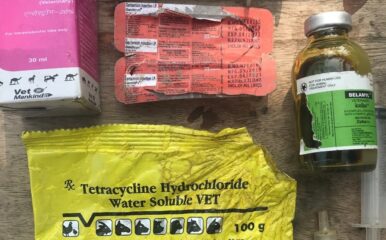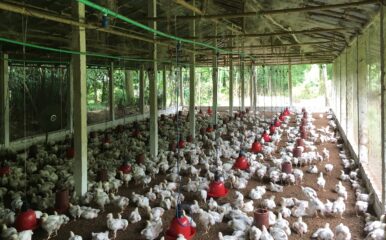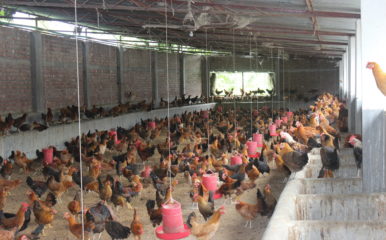
From survey participant to safer poultry entrepreneur
Published on 07/02/2023

Powerful people make a place more powerful. During ethnographic work in Chennai, Tamil Nadu, we had the opportunity to interact with Mrs Gayathri Ramesh Kumar, who shared her experience and endeavours in the poultry industry.
As a housewife, Mrs Kumar took care of her children and the house while her husband worked for a poultry trader as a driver. But in the wake of her husband’s resignation and feeling her family’s livelihood at risk, she decided to venture into poultry retailing.
Mr Kumar wasn’t interested at first, she had no financial backing and her family did not support undertaking this kind of business. However, eventually Mrs Kumar convinced her husband she should use her jewellery as collateral. She got a jewel loan from the bank and the new chicken retail business launched in 2007 in their own neighbourhood.
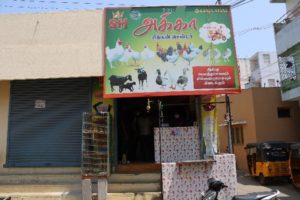
At first, contacting traders and price bargaining for chicken was not difficult given her husband’s former job, and Mr Kumar managed the loading of the chickens from the traders. After five years, Mrs Kumar had gained knowledge of the poultry trade and developed a good customer base by selling quality chicken. Door-to-door delivery options made her more profitable.
During the start-up period, she sold less than 10kg of chicken but she was not disappointed. She kept herself motivated, tried to interest her regular customers, in her delivery service and gave out brochures. During the COVID–19 lockdown, when all shops were affected by opening-time restrictions, more than 300 customers asked for home chicken deliveries. She sold more than 500kg a day during the peak lockdown period. Since then, some of her customers are now buying chicken regularly and she offers them a credit facility.
Running a chicken retail business is considered a tough job and most often these businesses are run by men. But even during difficult times such as COVID-19, Mrs Kumar has been very involved in the business. This has added to the shop’s popularity and although the business is called SH Chicken Centre, it is popularly known as ‘Akka Kadai’ or ‘Sister’s shop’ in English.
Mrs Kumar was one of the research subjects interviewed during our ethnographic study for the One Health Poultry Hub. For this, many traders were interviewed in Chennai, the main hub of the broiler trade in south India. Our objective was to understand the roles and responsibilities of actors within the production and distribution network (PDN) of broilers, including traders. We wanted to understand how their business practices and other factors can have the potential to be associated with the transmission of zoonotic infections.
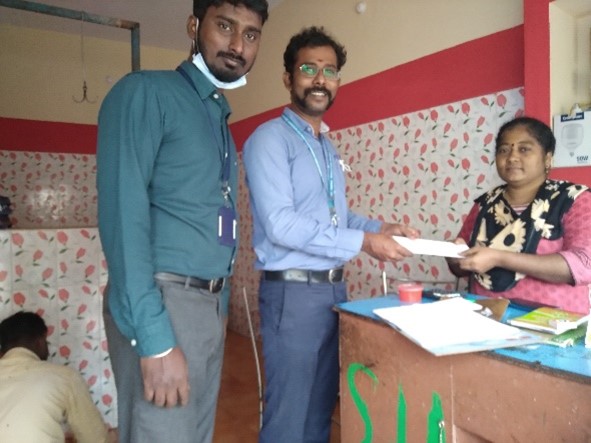
During our interaction with Mrs Kumar, we asked her about her shop’s biosecurity, hygiene, packaging and customer approach. Sadly, she knew little about these matters, so she was given contact details for advice and information on retail shop hygiene and maintenance, and directed to training opportunities.
It was in this way that Akka Kadai was one of the outlets invited to join the Hub’s capacity building programme. Mr Kumar participated in workshops and Mrs Kumar attended lectures online, via her husband’s mobile phone.
After completing the workshop, we visited Mrs Kumar’s shop to record her experience. We saw she had changed her chicken retail shop in a more hygienic way. In particular, she was regularly sanitising her slaughtering equipment and advising her shop staff to wear protective aprons. Moreover, she discouraged the butcher’s handling of cash and was promoting digital payment. She was paying attention to shop cleanliness (using disinfectant agents to clean the shop at least three times a day), waste and dead bird disposal, as well as staff personal hygiene. She explained that she had learnt some Do’s and Don’ts for chicken retail and said the programme was really helpful.
“This is our first certificate given by the college so we hung it in the shop entrance. Many of the customers ask as about the certificate…. Some of the nearby chicken retail shop owners voluntarily came to our shop and asked about the certificate and procedure to get the same,” she said.

